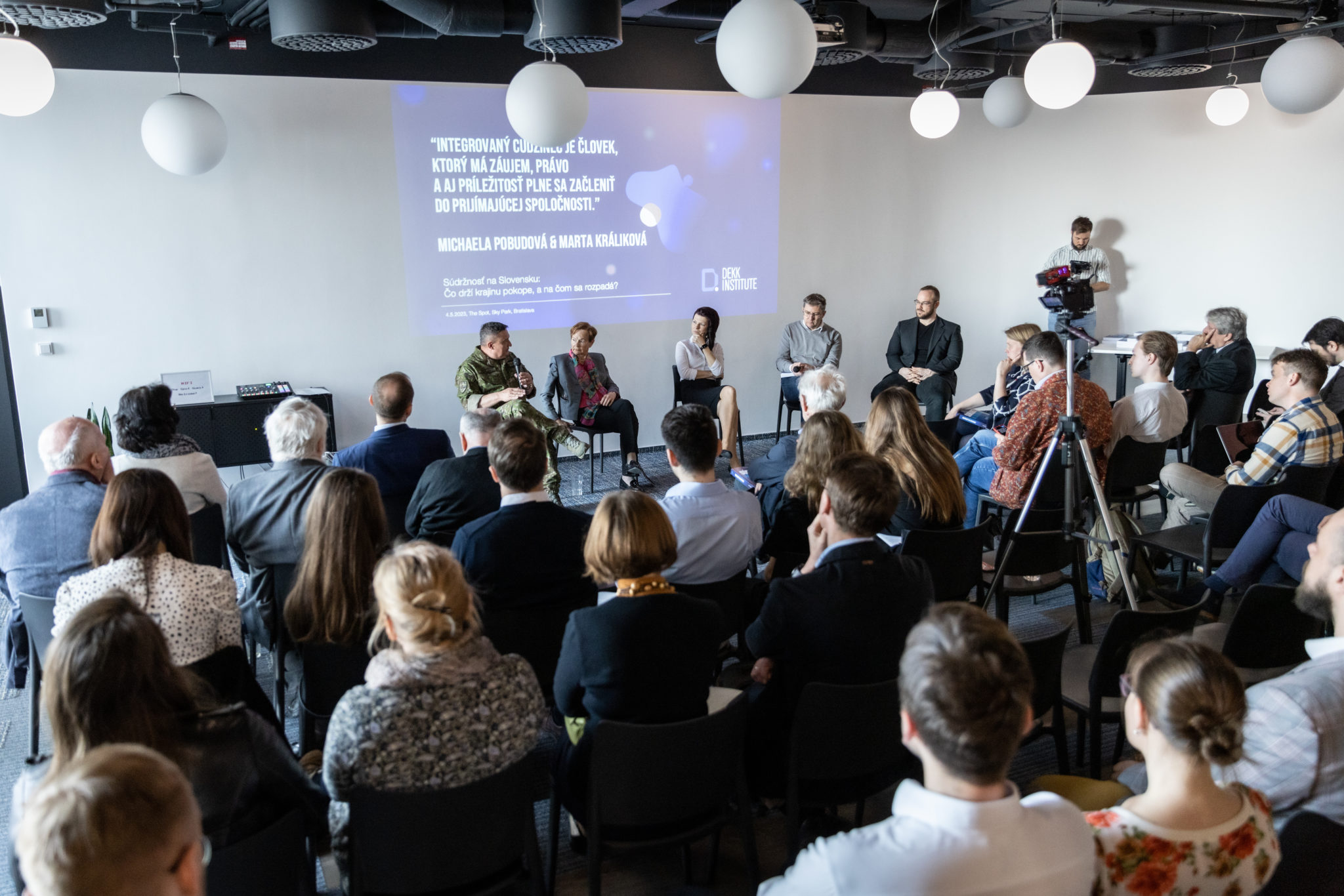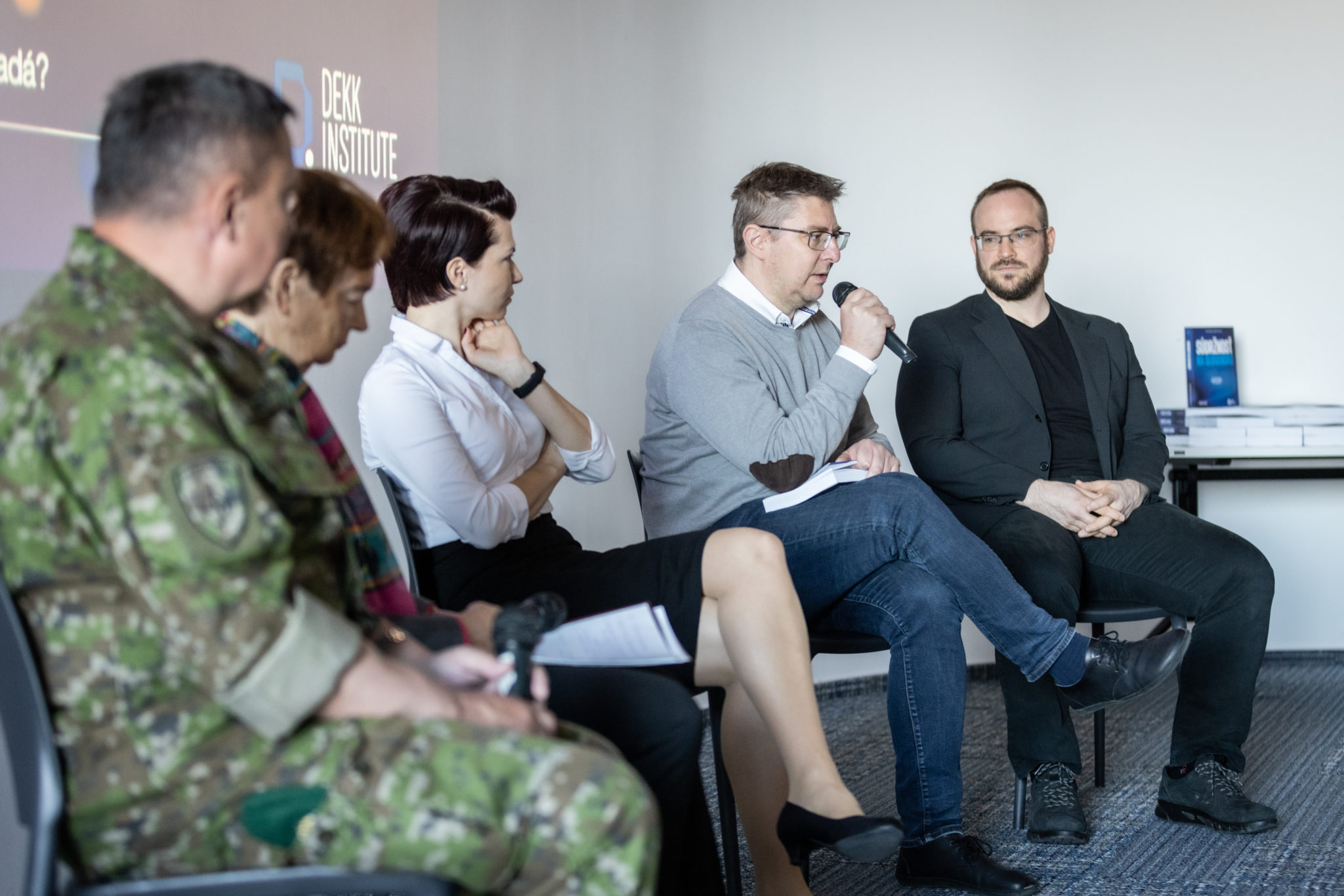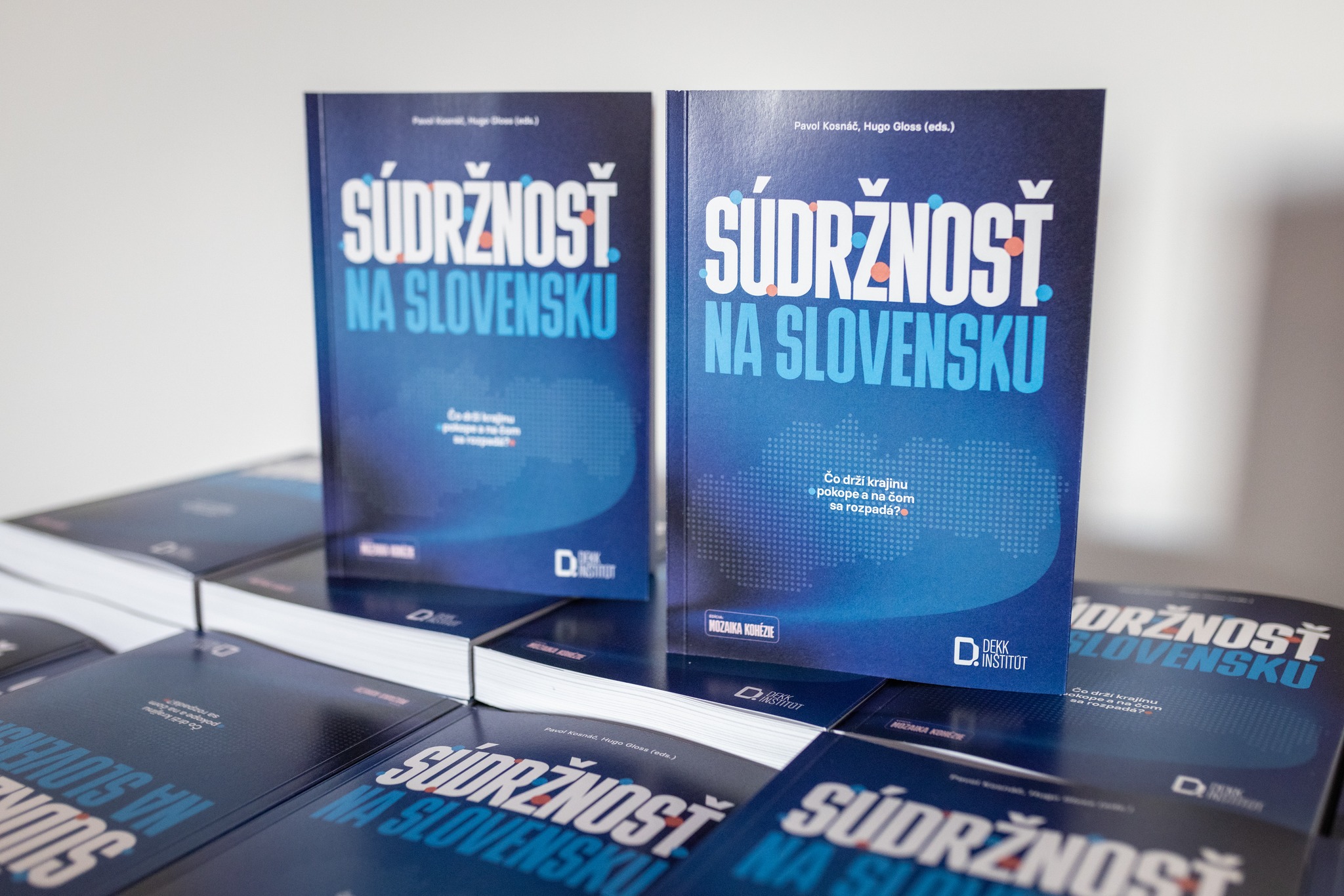
Originally, we intended to create a study for a small circle of experts that would map the causes of (dis)trust in Slovak society. However, as we gradually delved into this topic, we found that it would be more of a mosaic of factors from several areas of life and history of Slovakia.
What was originally an academic work for a few experts has thus become a publication that has attracted the interest of various social actors - experts working for the state, academics, journalists and the wider public. It was a moment that surprised - but also delighted us. It showed that people care a great deal about the functioning of our country. The aim of the book “Cohesion in Slovakia: what holds the country together and what is falling apart?” is to open a debate in Slovakia regarding trust, patriotism and social cohesion in our country. The book aims to serve all those who perceive the topic of cohesion in our society as important: various government departments, policy-makers, academia, media and the wider civil society.
We have launched a crowdfunding campaign of the first book in the Mosaic of Cohesion series. What will you find inside?
A total of 16 contributions from 20 authors in 367 pages of engaging text.
The experts who contributed to the book include 13 researchers from Slovak universities, the Slovak Academy of Sciences, Charles University in Prague, the University of Cambridge in the UK and the University of Agder in Norway, and 7 so-called "experts by experience", i.e. experts who by the nature of their practical work - for example, integration of foreigners, designing the Estonian collective identity concept, decentralisation of the state or commanding the Slovak Armed Forces - have insight into issues related to social cohesion and trust.
On Thursday, May 4, we presented the book to the public. All available copies were snapped up in no time. The event was very enjoyable. It was a joy to see how different worlds and generations intermingled constructively on the spot and had lively discussions together. Caring about one's country has a uniting property it seems :-)

Trends of (dis)trust in Slovakia
Pavol Kosnáč, DEKK Institute and Charles University
Hugo Gloss, DEKK Institute and Charles University
Social cohesion in sociological and psychological perspective
Justin E. Lane, CulturePulse
LeRon Shults, University of Agder
Emotions and social cohesion
Samuel Žilinčík, Masaryk University, winner of the prestigious British competition of the Royal United Services Institute
Trust as a fundamental pillar of social cohesion
Marianna Mrva, Institute of Sociology, Slovak Academy of Sciences
Roman Džambazovič, Faculty of Arts, Comenius University
Social cohesion in Slovakia from a historian's perspective
Roman Holec, Institute of History, Slovak Academy of Sciences
Social cohesion and nationalism
Ladislav (László) Vörös, Institute of History, Slovak Academy of Sciences
Social cohesion in Slovakia during modernization and the role of associations
Elena Mannová, Institute of History of the Slovak Academy of Sciences
Report on the state of cohesion in Slovakia
Marína Zavacká, Institute of History of the Slovak Academy of Sciences
Elites and social cohesion in Slovakia
Soňa Szomolányi, Faculty of Arts, Comenius University
Catholics and Social Cohesion in Slovakia: Historical (Self)Victimisation and Historical (Self)Reflection
Agáta Šústová Drelová, Institute of History, Slovak Academy of Sciences
Historical roots of Slovak Russophilia, its consequences and possible solutions
Daniel Šmihula, diplomat and political scientist
The road to social cohesion: the Estonian experience
Marianna Makarova, Strategic Communication Advisor, Estonian Government Office
Governance and social cohesion
Viktor Niznansky, Municipal Research and Advisory Centre, n.o.
Integration of foreigners in Slovak
Michaela Pobudová, MAREENA, o. z.
Marta Králiková, MAREENA, o. z.
A cross-section of the development of trust in the government in Slovakia between 1990 and 2023
Martin Slosiarik, FOCUS Agency
Is Slovakia vulnerable? The Army and Patriotism
gen. Daniel Zmeko, Chief of the General Staff of the Slovak Armed Forces

© 2024 DEKK Institute | All rights reserved | CREA:THINK STUDIO
Michaela is currently finishing her bachelor's degree in psychology at the Faculty of Philosophy of the Comenius University in Bratislava. In psychology, neurocognitive topics, psychosomatics, identity building and community building are close to her heart. While still in grammar school, she was mentored by neuroscientist Dominika Fričová, who is dedicated to researching neurodegenerative diseases - in this topic, Michaela continues today in her current work under the guidance of neuropsychologist Petra Brandoburová in the Neuropsy laboratory.
Together with our research intern Filip, they managed to succeed at the international level of the ŠVOK (Student Scientific and Professional Conference).
At DEKK, she is currently processing statistics on the family behavior of the Slovak population. She is fascinated byobserving the life of diverse communities and their impact on the individual - from the Roma community, which is at the margins of society, where she volunteered, to the community of purposeful young people who yearn for knowledge at the Anton Neuwirth College, where Michaela completed her university program.
She likes to devote her free time to organizing events that contribute to a better society. She also enjoys a good psychology book, English classics, or time with friends.
Michaela je aktuálne v závere bakalárskeho stupňa v odbore psychológia na Filozofickej fakulte UK. Z psychológie sú jej blízke neurokognitívne témy, psychosomatika, budovanie identity a budovanie komunít. Ešte v čase gymnázia ju mentorovala neurovedkyňa Dominika Fričová, ktorá sa venuje výskumu neurodegeneratívnych ochorení - v tejto téme Michaela pokračuje aj dnes vo svojej súčasnej práci pod vedením neuropsychologičky Petry Brandoburovej v laboratóriu Neuropsy.
Spolu s našim výskumným stážistom Filipom sa im podarilo uspieť na medzinárodnej úrovni študentskej súťaže ŠVOK (Študentská vedecká a odborná konferencia).
V DEKKu sa v súčasnosti venuje spracovaniu štatistiky o rodinnom správaní slovenskej populácie. Fascinuje ju sledovať život rôznorodých komunít a ich vplyv na jednotlivca - od rómskej komunity, ktorá je na chvoste spoločnosti, kde dobrovoľníčila, až po komunitu cieľavedomých mladých v Kolégiu Antona Neuwirtha, ktorí túžia po poznaní, kde Michaela absolvovala vysokoškolský program.
Voľný čas rada venuje organizácii podujatí, ktoré prispievajú k lepšej spoločnosti, knihe od dobrého psychológa, či anglickej klasike alebo ho rada strávi s priateľmi.
Filip is in charge of working with psychological resources at DEKK.
After completing his undergraduate studies in psychology at Comenius University, he went to Utrecht University to gain study experience, but left after a period of time due to unfulfilled expectations. At the same time, he is a graduate of the two-year programme of the Anton Neuwirth College. It was there that he first encountered Aristotle and his idea that everything living in the world has a natural goal towards which it is directed: to prosper.
So he began to ask himself the question: if all beings have a goal deeply rooted in their nature, why do humans go against it and engage in destructive behavior? He sees in DEKK the hope of exploring part of this question, i.e., why societies fall apart. In addition, he is also interested in the individual dimension of this question: why do some individuals' lives fall apart? For this reason he has been involved in social assistance to homeless people in various low threshold centres in Bratislava or Brno.
In the past, he has organised several discussions with public figures, journalists and statesmen and also won the national competition ŠVOK in the category Psychology with his research.
In his free time he likes to read newspapers, listen to the Red Hot Chilli Peppers or sit in the city for a coffee.
Paulína is studying at the Bratislava International School of Liberal Studies on a bachelor's degree and at the same time she is studying in the Nexteria Leadership Academy 3-year development program, where she develops her soft skills and organizes community activities.
In the past, she worked on projects for Microsoft, Tatra banka, Slido and the city of Trenčín.
She likes to think about why society is the way it is. Her passion is psychology, informal education and self-development.
Michal Gačko is a graduate of the Faculty of Electrical Engineering and Informatics at the Slovak Technical University in the field of applied informatics. He studied for one semester in Norway at the Norwegian University of Science and Technology as part of the Erasmus program. He has experience in the design, implementation and management of various types of database systems, as well as in the design and implementation of architectural patterns and structures in software systems. In addition, it deals with data analysis and data visualization.
Veronika Cigáneková is an analyst focusing on public policies.
She graduated in philosophy from King’s College London, where she researched the connections between philosophy and public policy in the final stages of her studies. She later pursued a master’s degree in public policy at Sciences Po in Paris, with a focus on policy analysis, legislative development, and practical solutions. While in Paris, she also worked as an analyst at the OECD, specializing in public trust in institutions.
Currently, in addition to her work at DEKK, Veronika works alongside a member of the National Council of the Slovak Republic, focusing on culture and media.
Veronika has extensive experience in the non-profit sector, where she worked on themes such as civic participation, youth engagement, the development of social entrepreneurship, and the issue of the “brain drain” from Slovakia. Among her notable projects is the founding and two-year leadership of Nexteria Global HUB.
Hugo Gloss is the Chief Operating Officer (COO) of the DEKK Institute, responsible for the smooth running of the administration and is also responsible for the preparation and successful implementation of projects.
He studied International Relations and Diplomacy at the University of Bologna, Roma Tre University in Rome and completed a one-year training programme at the Anton Neuwirth College. He interned at the Representation Office of the Slovak Republic to the Holy See and at the Department of Communication and Prevention of the Presidium of the Police Force of the Slovak Republic. He worked at Accenture and coordinated humanitarian projects of the Caritas Slovakia in Iraq, Syria, Lebanon and Ukraine. As part of his work, he has visited countries where social cohesion is seriously weakened, and he is therefore concerned that Slovakia should not follow a similar path.
Since September 2024 he has been an internal PhD student at the Department of Sociology, Faculty of Arts, Comenius University in Bratislava. In his studies he focuses on researching the theory of social cohesion and developing an experimental model of its measurement and strengthening in Slovak society. He is married and has four children.
Pavol Kosnáč is the Scientific Director of the DEKK Institute and the Principal Investigator of the World Values Survey (WVS) program in Slovakia and the Czech Republic, which is covered by DEKK. He represents the DEKK Institute in the UNDP project analyzing social cohesion in Bosnia and Herzegovina. He is also the author of the program Slovakia in data, the aim of which is to accumulate and make available a database of complex social science data to the general and expert public.
During DEKK Institute's cooperation with Charles University in 2022-2023, he led a team of 9 scientists investigating the impact of social changes on the generational shift in values and social cohesion, applied for example in the analysis of the development of trust in governments in the V4 countries, the growing (un)willingness to defend the country or the impact of war on Ukrainian culture. During the same period, he was also a member of the advisory board of the Forgiveness and Future Building project at the University of Cambridge.
He studied comparative religious studies in Bratislava, Islam and philosophy of science at Oxford, and completed academic placements at the London School of Economics in London and Mahidol University in Bangkok. He received his doctorate in political science at Masaryk University in Brno.
He is interested in integration of field research methods, psychological and cognitive research tools, public opinion polls and big data. He specializes in the overlap between ideology, religion, violence and war. Experience from humanitarian and research projects in Central and Eastern Europe, the Middle East and India led him to try to understand the issues of complex systems, social cohesion and social stability.
He works as a consultant for humanitarian organizations and scientific workplaces in Great Britain, Ukraine, Iraq and Thailand. He is a registered (forensic) expert in the field of Social Sciences and Humanities in matters of religion at the Ministry of Justice of the Slovak Republic and represents the Slovak Republic in the World Association for Public Opinion Research (WAPOR) and the World Values Survey Association (WVSA). He is a member of the Slovak Society for the Study of Religions (SSŠN) in Bratislava, the Royal Anthropological Institute (RAI) in Great Britain, and a member of the advisory board of the Inform Institute at King's College London.